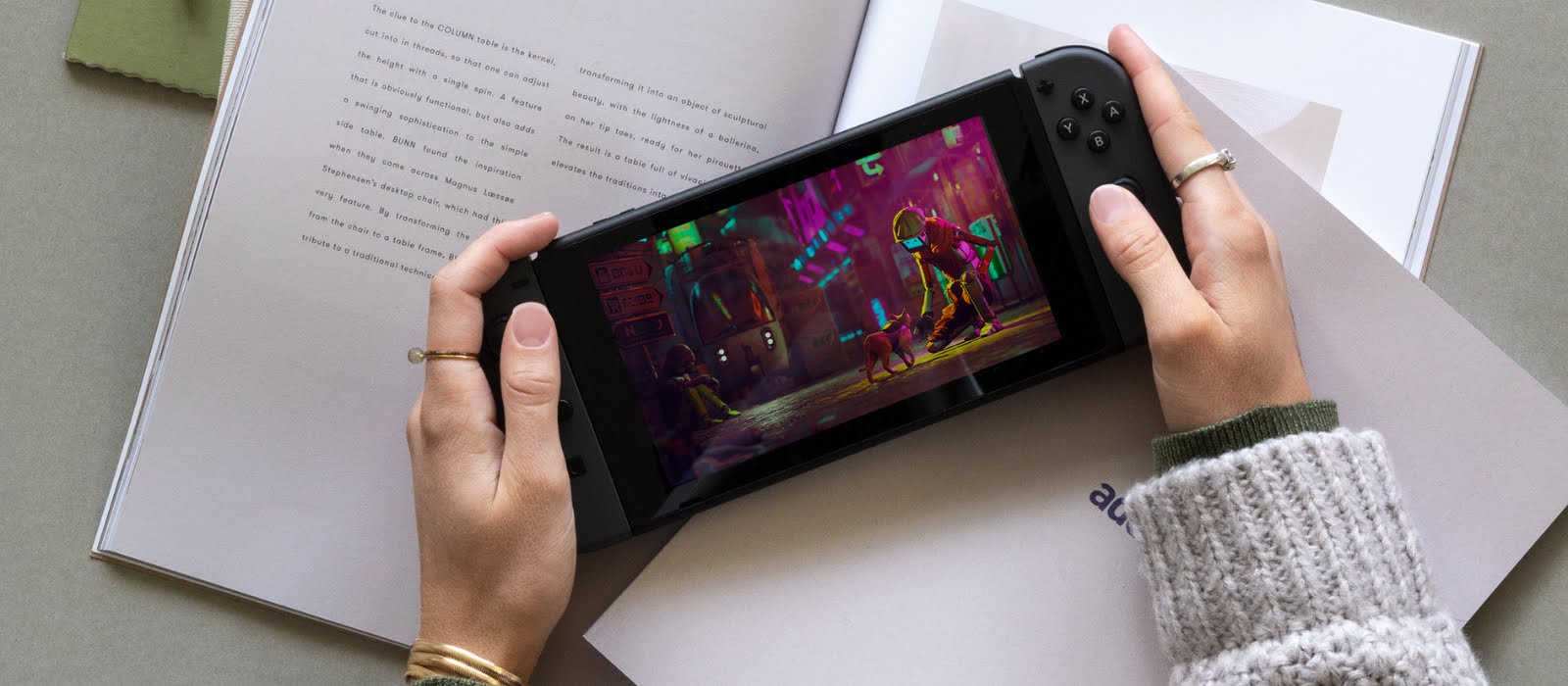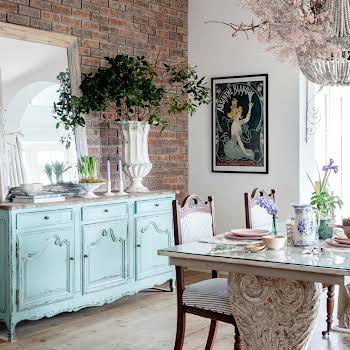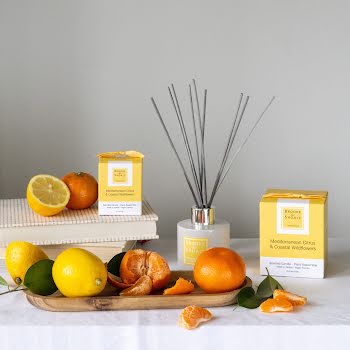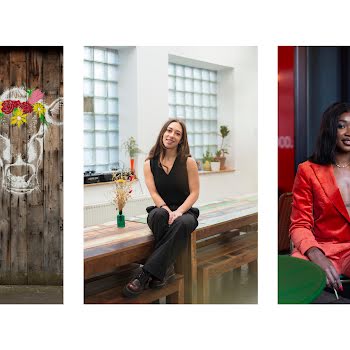
Chances are, you have a gaming console of some kind in your home, but how often have you played something on it? As more women engage in gaming, Laura Kennedy considers the soft power of the female consumer and why critics of gaming have it all wrong.
In the middle of the pandemic, my husband and I bought a Nintendo Switch, the most popular portable gaming console of the past several years. For months, we searched online, unable to find one. They were sold out everywhere in the UK, where we live. Eventually, we managed to find a second-hand Japanese Switch on eBay. Such was our desperation to engage in any environment other than the one in our house. “Will that even work over here?” I asked as he hunched and fiddled with cables behind the TV. “I suppose we’re about to find out,” he answered in a tone that said, “God, I need this. I haven’t seen anyone but you in a year.”
The fact that we went to these lengths to play games, as two adults living in the London suburbs with our cat, Mabel, speaks to the total boredom and collective hunger for escape of that period. Within days, I was playing Animal Crossing: New Horizons, a game in which you build an impossibly cute island paradise populated with goofy animal characters.
If, when you think of games, you imagine teenage boys playing first-person shooters like in Call of Duty while insulting one another through headsets like disenfranchised telemarketers, you may be confused. Animal Crossing is a game without any ultimate end goal; an experience for its own sake. There is no threat, competition or winning. You just curate your stupid, gorgeous island, build a little house, check in with your villagers (I befriended a duck called Ketchup and spent significant time avoiding a T-shirt-wearing, trouser-less gorilla who walked around my island baring his conspicuously hairless backside) and watch as the seasons change in real-time. It is nothing more or less than a cosy experience which leaves you feeling soothed. In the pandemic, it was sheer escapism and stress management.
I used the game to catch up with my best friend at home in Dublin. Her in-game avatar arrived to tour my rainy island wearing an American football helmet, a wrestling singlet and no shoes, and we caught up on Zoom (but of course) while playing. Two women in their thirties, touring a cartoon island through digital avatars that look like Cabbage Patch dolls, while talking about how the global chaos we were living through was impacting our lives. I didn’t come home or see my friend for over two years – playing games was not a frivolity. It was a meaningful means of recreation, connection, and well-being – a way to be together when we couldn’t.
We were two among millions doing the same. Animal Crossing: New Horizons was an astronomical global success, selling almost 40 million copies worldwide and breaking the console world record for most digital units sold in a month. For many people – women included – who did not relate to the mean conception of a gamer, or perhaps felt excluded by it, it was an initiation into games as an adult and the beginning of a reconnection with the creativity, imagination, and well-being of play. Stray, a beautiful game in which you play as a non-verbal cat protagonist in an exquisitely crafted, rich dystopian world populated by sentient robots, has been, though darker and slightly grittier, the game that has given me a similar sense of contentment this year.
The preconception of games as the remit of angry young men is sexist in every possible direction. It diminishes the countless men whose hobbies include a more diverse portfolio of games than the classically violent and aggressive ones we associate with them. It dismisses the many women who navigate the gaming space completely differently, and it rests on lazy old tropes that violent or sexualised games cause harm to those who play them.
Recent research published in the peer-reviewed academic journal Computers and Human Behaviour suggests that sexualised games don’t lead to misogynistic views or damaging mental health outcomes, while an analysis of 28 global studies dating back to 2008 found no notable correlation between video games and violent behaviour. There is some evidence, however, of a positive correlation between video game-playing and well-being.
While the women of Ireland, and the wider world, are increasingly exploring gaming, and while the industry diversifies and democratises in a way that includes and even celebrates the female consumer, we are still holding on to obsolete ideas about the types of people who engage in gaming, and the kinds of games they play. Meanwhile, there is a soft power shift going on, and it’s happening under our noses.
Enter the “cosy game”, a genre described by games journalist Yahtzee Croshaw as “games with low narrative stakes; gameplay usually leaning more on completionism and task management than on reflex skill challenge, a gentler, understated tone, a general air of niceness and friendship, often with a pleasing, cartoonish art style”.
To quote novelist and gamer Sarah Maria Griffin, who is quickly becoming a prominent voice in games journalism, cosy games are “a vibe”. While most of the industry’s heavy-hitters – AAA games like Grand Theft Auto, the new version of which will see a female protagonist for the first time – have a history of deeply entrenched machismo and quite a shallow depiction of masculinity, for women who aren’t interested in that type of game, Griffin says, “there’s everything outside of the AAA world. There’s a huge, lush, growing world of small and independent studios that are run by women, run by queer people, making really interesting work. That’s where the good stuff is happening, just outside of that huge, glaring, moneyed, mainstream world… and that stuff – I think – is generally more friendly to women.” Cosy games aren’t gendered female; they’re just a type of game that exists outside that narrow, button-mashing, high-anxiety genre rooted in a sort of camp, toy-soldiers depiction of hypermasculinity.
One of the female makers doing something different is Treasa McCabe, director, tech lead and co-designer at Galway-based indie game developer Spooky Doorway. We catch up via Zoom after Treasa politely emailed the night before to say that if she didn’t turn up, it’s because she’s gone into labour – we’re chatting about women and gaming on her due date, and something about that feels very apt. Unusually, McCabe’s mother was the gamer in their house when she was growing up. They played together. At university, McCabe studied engineering – “I really thought I was going to be a mechanical engineer,” she says – but creating a game for a college class where the lecturer offered an Xbox as the prize for the best entry gave her a sense of the unique confluence of technical, aesthetic and conceptual skill required to make a game.
As part of the indie game industry, along with her husband Dave and the team they work with at Spooky Doorway, McCabe creates nuanced, narrative-based games which have a unique flavour of Irish character and humour. These include the cult point-and-click adventure game The Darkside Detective, which follows the exploits of Detective Francis McQueen and has all the nostalgia of classic games of the 1980s and ’90s, but with a modernised sense of humour and complexity.
McCabe suggests going to Annapurna Interactive – an online platform that curates games it describes as “personal experiences for everyone” to find the richness and diversity that exists in indie games. You’ll find countless examples of the type of game you didn’t know existed, cosy among them. Saying that you don’t enjoy games is a bit like saying you don’t like music when all you’ve ever heard is country and western. “One of the barriers to entry is that a lot of women say, ‘I don’t like games,’” McCabe says. “And I’m going, ‘Well, you might be playing the wrong ones.’ But I suppose the reason they’re playing the wrong ones is because all they’re seeing is Call of Duty advertised on the side of a bus… A lot of these problems are solved in the indie space, but they don’t make money, and nobody knows about them.”
There are of course plenty of women who love first-person shooter games like Call of Duty – I’m just not one of them, and feel no sense of imposter syndrome for that. A pressure for lightning-quick reaction times and the constant spectre of a violent death breathing down my neck just doesn’t get my recreation juices flowing. I want, as McCabe puts it, to be distracted in a different way, and to have “a more cerebral, appreciative, of-the-moment experience”.
Gaming is subject to a good deal of bigoted gatekeeping, with some-guy-or-other seemingly determining a true “gamer” from a “casual”, and a “real skill-based” game from one that’s just fannying about a post-apocalyptic dystopia as a non-verbal cat. To that guy, I say this: “Settle down, Raymond.” (In my head, he’s called Raymond.) “There’s room for all of us.” For me and many women, gaming is a way of stimulating well-being and creativity. It isn’t something I have to be supremely experienced or skilled at before I’m deserving of engaging in it. Or something I have to justify to people who consider themselves too serious or intellectual to play games. I don’t play games “as a woman”, or in a gendered way. I just play games that appeal to my imagination, aesthetic and appreciation for narrative. So, it seems, do many of us, and the industry is starting to notice.


A SHORT HIKE
You play a plucky, intrepid bird, soaring, gliding and climbing your way around an ever-changing landscape. A small adventure, packed with delight that’s available on all major platforms.

ANIMAL CROSSING
Cutesy and moreish, the cult Nintendo Switch game owes a debt to viral hits like FarmVille, with none of the predatory, addictive design. A sweet, mellow way to indulge your inner child.

STARDEW VALLEY
A nice way to while away an afternoon; there is no real finish line to aim for in this sweet farming and crafting game, a big hit in the “tend and befriend” genre. Available on all major platforms, including mobile.

STRAY
Two words: miaow button.If you need to know more, know this is a beautiful, atmospheric adventure that is also a very funny cat simulator. Critically acclaimed, it is available on all major platforms.

UNPACKING
Explore the stages of a person’s life through the spaces they unpack their belongings into. Don’t be fooled by the cartoony graphics; there is a rich, touching story threaded through this puzzle game.
Photography by Marlene Wessels. This article originally appeared in the winter 2022 issue of IMAGE Magazine. Have you thought about becoming an IMAGE subscriber? Our Print & Digital subscribers receive all four issues of IMAGE Magazine and two issues of IMAGE Interiors directly to their door along with access to all premium content on IMAGE.ie and a gorgeous welcome gift worth €60 from The Handmade Soap Company. Visit here to find out more about our IMAGE subscription packages.























